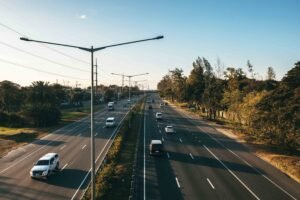NLEX Corporation has installed two rainwater collection systems at the SCTEX Floridablanca and Dinalupihan rest bays as part of its efforts to integrate sustainability in its operations.
These rainwater recovery systems will harvest large volumes of rainwater, which will then be used for the public restrooms in the said areas. The rainwater catchments can store and repurpose approximately 2,000 liters of water, helping beef up water sufficiency.
In its bid to further reduce its carbon footprint, NLEX has also started to put motion-sensor lights in its buildings. These lights only turn on when movement is detected and turn off when there is no action, minimizing wasted energy.
Close to 100 motion-sensor lights are up for installation within the year in 12 NLEX-SCTEX offices located in Caloocan City, Valenzuela City, Bulacan, and Pampanga.
“With sustainability at the core of our values, we always ensure that our operations and environmental responsibility programs center on cutting our carbon footprint, reducing waste, and improving resource efficiency all for the benefit of our communities, more so the next generation,” said NLEX Corporation President and General Manager J. Luigi L. Bautista.
Bautista added that these initiatives are also in alignment with the Metro Pacific Group’s commitment to help the Philippines meet the United Nations Sustainable Development Goals particularly UNSDG 6 (Clean Water and Sanitation), UNSDG 7 (Affordable and Clean Energy), UNSDG 12 (Sustainable Consumption and Production Patterns), and UNSDG 13 (Climate Action).
Aside from the rainwater recovery systems and motion-sensor lights, NLEX uses solar power panels and LED lights in its operations which has since reduced its carbon emissions by roughly 5,000 tons equivalent to around 229,358 trees saved.
The company also previously cited that it has been strictly prohibiting single-use plastics in food deliveries, canteen operations, and other food services within its premises to reduce plastic pollution and has planted around 200,000 trees in the entire road network as part of its efforts to help provide clean air on the road.



